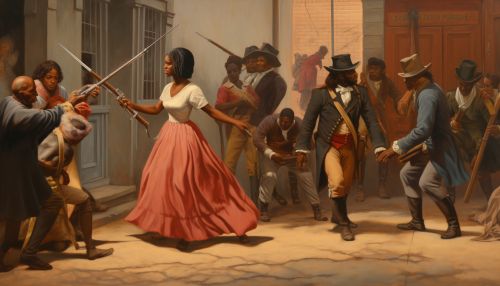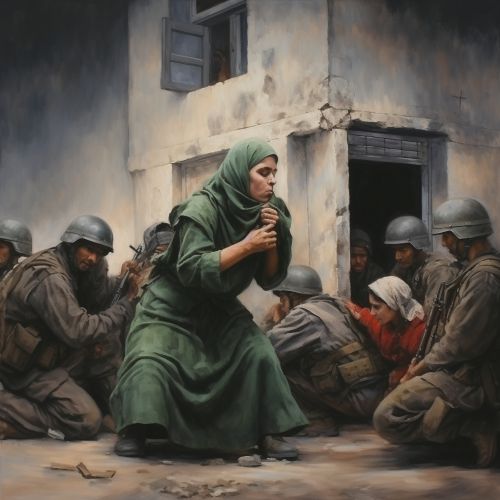Oppression
Definition and Overview
Oppression is a multifaceted concept that refers to the exercise of authority or power in an unjust or cruel manner. It involves a set of policies, practices, norms, and traditions that systematically exploit one social group by another, leading to the disadvantaged group's marginalization. Oppression is often institutionalized and maintained through laws, regulations, and societal norms, making it a pervasive and enduring feature of many societies Read more.
Historical Context
Throughout history, various forms of oppression have been practiced, including slavery, apartheid, and colonialism. These practices were often justified by ideologies that dehumanized certain groups of people, such as racism, sexism, and classism. These ideologies were used to legitimize the unequal distribution of resources, power, and status among different social groups.


Types of Oppression
There are several types of oppression, including social, economic, political, and cultural oppression.
Social Oppression
Social oppression refers to the systematic mistreatment and exploitation of a group of individuals by another group, based on their social identities, such as race, gender, sexual orientation, or class Learn more.
Economic Oppression
Economic oppression involves the systematic deprivation of certain groups of their economic rights, leading to their economic marginalization and poverty. This form of oppression is often perpetuated through discriminatory laws and practices that prevent certain groups from accessing economic opportunities and resources Learn more.
Political Oppression
Political oppression refers to the exercise of power in a manner that is unjust, cruel, or oppressive. It involves the use of state power to suppress dissent, control the populace, and maintain the status quo. This form of oppression is often characterized by human rights abuses, political corruption, and the absence of democratic freedoms Learn more.
Cultural Oppression
Cultural oppression involves the marginalization and erasure of certain cultures, languages, and traditions. This form of oppression is often perpetuated through cultural assimilation policies, the suppression of indigenous cultures, and the imposition of a dominant culture Learn more.
Causes of Oppression
Oppression is caused by a variety of factors, including social, economic, political, and cultural factors. These factors often interact with each other, creating a complex web of oppression that is difficult to dismantle.
Social Factors
Social factors that contribute to oppression include prejudice, discrimination, and stereotypes. These attitudes and behaviors serve to devalue certain social groups and legitimize their mistreatment Learn more.
Economic Factors
Economic factors that contribute to oppression include economic inequality, poverty, and the unequal distribution of resources. These factors often result in certain groups being economically disadvantaged and marginalized Learn more.
Political Factors
Political factors that contribute to oppression include political corruption, the abuse of power, and the absence of democratic freedoms. These factors often result in the suppression of dissent, the violation of human rights, and the perpetuation of oppressive regimes Learn more.
Cultural Factors
Cultural factors that contribute to oppression include cultural imperialism, the erasure of indigenous cultures, and the imposition of a dominant culture. These factors often result in the marginalization and erasure of certain cultures, languages, and traditions Learn more.
Effects of Oppression
Oppression has a wide range of effects on individuals and societies, including psychological, social, economic, and political effects.
Psychological Effects
The psychological effects of oppression include mental health issues, such as depression, anxiety, and post-traumatic stress disorder. Oppression can also lead to internalized oppression, where the oppressed group internalizes the negative stereotypes and attitudes of the oppressor Learn more.
Social Effects
The social effects of oppression include social inequality, discrimination, and social exclusion. Oppression can also lead to social conflict and violence, as oppressed groups struggle to resist their oppression and fight for their rights Learn more.
Economic Effects
The economic effects of oppression include economic inequality, poverty, and the unequal distribution of resources. Oppression can also lead to economic instability and conflict, as economic inequality fuels social tensions and conflicts Learn more.
Political Effects
The political effects of oppression include political instability, conflict, and the violation of human rights. Oppression can also lead to the rise of oppressive regimes and the suppression of democratic freedoms Learn more.
Resistance to Oppression
Throughout history, oppressed groups have resisted their oppression through various means, including social movements, protests, and revolutions. These forms of resistance have often played a crucial role in challenging oppressive systems and bringing about social change Learn more.


